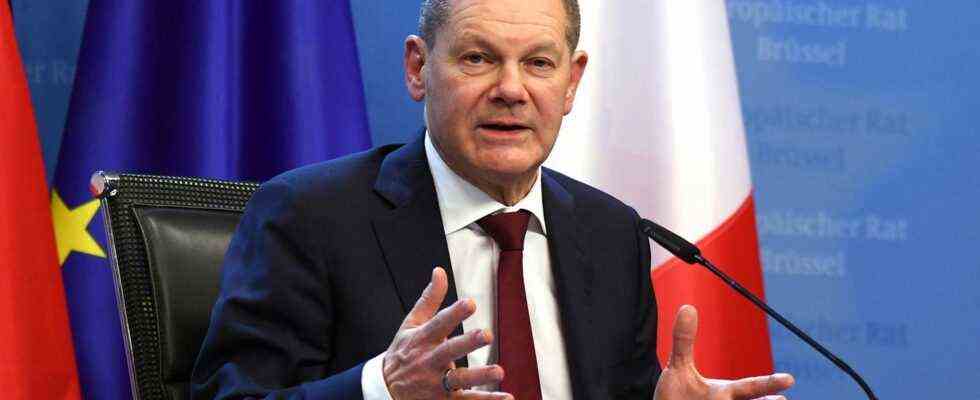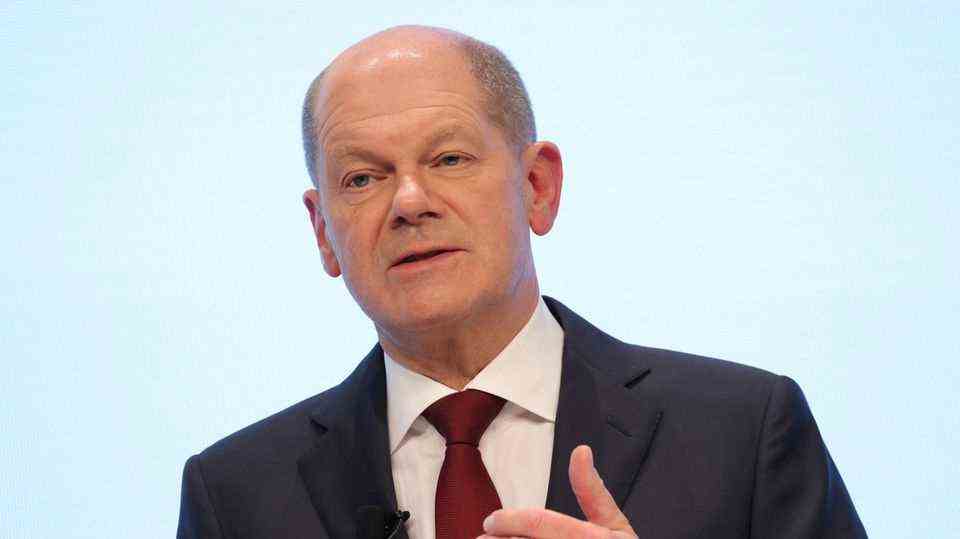Summit in Brussels
Attack on Ukraine: EU threatens Russia with “massive consequences”
Federal Chancellor Olaf Scholz at a press conference at the end of the EU summit in Brussels
© John Thys / DPA
Chancellor Scholz’s EU summit premiere dragged on into the night. The EU countries warned Russia urgently, but did not find a common line on energy prices. Scholz felt fine anyway.
EU leaders have threatened Russia with retaliation in the event of an attack on Ukraine. An invasion would result in severe sanctions, according to the final declaration of the EU summit in Brussels. Russia urgently needs to defuse the tensions caused by the deployment of troops on the border with Ukraine and aggressive rhetoric. Any further military aggression would have “massive consequences and high costs”. Sanctions coordinated with partners were cited as an example.
Scholz emphasizes the inviolability of the borders in Europe
Chancellor Olaf Scholz (SPD) spoke on Friday morning after his first summit of the “preparation for a case that is not supposed to occur”. For all EU countries it is “of the utmost importance that the borders in Europe are not shifted,” emphasized Scholz in a joint press conference with French President Emmanuel Macron. He stated that the EU countries had extended the sanctions imposed after the annexation of Crimea in 2014 for a further six months.
According to Macron, however, the EU approach is not just about deterrence, but also about reviving a dialogue with Russia. “We have to find the only way that (…) can prevail, namely the way of discussion and political solution.”
The final declaration also states that diplomatic efforts are to be encouraged in order to achieve full implementation of the Minsk Agreement of 2015 – especially in the so-called Normandy format. This is a round of negotiations in which Germany and France have been trying to mediate between Ukraine and Russia since 2014. Recently, however, there has been little progress. Both sides accuse themselves of not keeping agreements.
On Thursday evening, NATO published a statement similar to that of the EU. It stated that alliance members were deeply concerned about the substantial, baseless and unjustified Russian troop deployment on the Ukrainian border. The impact of the current situation on the security of the Alliance is currently being investigated. NATO will always react decisively to a deterioration in the security environment – if necessary also by strengthening its own defense system.
EU countries are putting pressure on Scholz because of Nord Stream 2
The participants at the EU summit left open what sanctions could be imposed in the event of a Russian attack on Ukraine. According to diplomats, sanctions against state companies and oligarchs close to President Vladimir Putin are being discussed. In addition, options include excluding Russia from the Swift payment system and operating the Nord Stream 2 natural gas pipeline from Russia to Germany.
Scholz spoke out against combining the operating license for Nord Stream 2 with efforts to de-escalate the Ukraine crisis. “With regard to Nord Stream 2, this is a private-sector project,” he said of the project that the last Social Democratic Chancellor, Gerhard Schröder, had agreed with Putin in 2005.
Ukraine itself, but also EU countries such as Poland, Lithuania and Latvia, on the other hand, are demanding that Germany use the Baltic Sea pipeline as a means of pressure against Putin. The Latvian Prime Minister Krisjanis Karins accused Moscow of using the natural gas pipeline to “blackmail” the EU. The European Parliament had previously called for the abandonment of Nord Stream 2 by a large majority in a non-binding resolution.
The EU also called on the authoritarian government in Belarus to “release all political prisoners immediately and unconditionally”. There, the husband of the Belarusian opposition leader Svetlana Tichanovskaya was sentenced to 18 years in prison on Tuesday.
Scholz and Macron disagree on atomic energy
Massive differences became clear again on the subject of energy: some Eastern countries questioned the EU trade in pollution rights because of the significantly higher prices and thus prevented the adoption of a joint declaration.
There was also no agreement between Macron and Scholz on a sensitive issue: the EU Commission wants to propose next week that nuclear energy be classified as “sustainable” – this is met with massive rejection, especially by the Greens in the Ampel coalition. Macron defended the plan by saying that although nuclear power was “not to be equated with renewable energies,” it emits little carbon dioxide. He had previously called nuclear energy essential for the goal of EU climate neutrality by 2050.
Scholz, however, called the debate about the so-called taxonomy “completely overrated”. Even the proposal does not change the fact that Germany will shut down the last nuclear power plant in the coming year. During the negotiations, Berlin failed to organize enough votes to block the proposal.
The 14-hour negotiations in Brussels reminded Scholz of the coalition negotiations with the Greens and the FDP. “They were also very long,” he said in the nightly press conference after the summit. However, he praised the fact that most of the questions had been constructively struggled to find solutions. In this respect, the summit was a good experience. “I felt good.”


